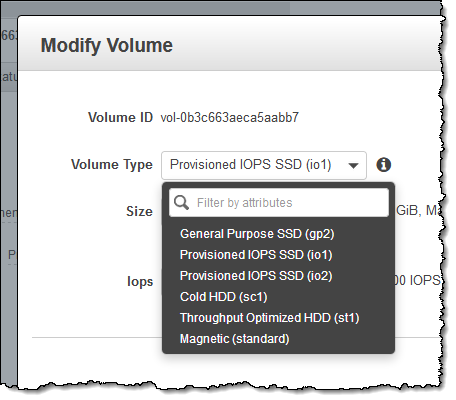We launched EBS Volumes with Provisioned IOPS way back in 2012. These volumes are a great fit for your most I/O-hungry and latency-sensitive applications because you can dial in the level of performance that you need, and then (with the launch of Elastic Volumes in 2017) change it later.
Over the years, we have increased the ratio of IOPS per gibibyte (GiB) of SSD-backed storage several times, most recently in August 2016. This ratio started out at 10 IOPS per GiB, and has grown steadily to 50 IOPS per GiB. In other words, the bigger the EBS volume, the more IOPS it can be provisioned to deliver, with a per-volume upper bound of 64,000 IOPS. This change in ratios has reduced storage costs by a factor of 5 for throughput-centric workloads.
Also, based on your requests and your insatiable desire for more performance, we have raised the maximum number of IOPS per EBS volume multiple times:
- August 2012 – 1,000 IOPS per EBS volume.
- November 2012 – 2,000 IOPS per EBS volume.
- May 2013 – 4,000 IOPS per EBS volume.
- August 2014 – Up to 256K per I/O request (16x larger).
- March 2015 – 20,000 IOPS per EBS volume.
- December 2017 – 32,000 IOPS per EBS volume.
- November 2018 – 64,000 IOPS per EBS volume.
The August, 2014 change in the I/O request size made EBS 16x more cost-effective for throughput-centric workloads.
Bringing the various numbers together, you can think of Provisioned IOPS volumes as being defined by capacity, IOPS, and the ratio of IOPS per GiB. You should also think about durability, which is expressed in percentage terms. For example, io1 volumes are designed to deliver 99.9% durability, which is 20x more reliable than typical commodity disk drives.
Higher Durability & More IOPS
Today we are launching the io2 volume type, with two important benefits, at the same price as the existing io1 volumes:
Higher Durability – The io2 volumes are designed to deliver 99.999% durability, making them 2000x more reliable than a commodity disk drive, further reducing the possibility of a storage volume failure and helping to improve the availability of your application. By the way, in the past we expressed durability in terms of an Annual Failure Rate, or AFR. The new, percentage-based model is consistent with our other storage offerings, and also communicates expectations for success, rather than for failure.
More IOPS – We are increasing the IOPS per GiB ratio yet again, this time to 500 IOPS per GiB. You can get higher performance from your EBS volumes, and you can reduce or outright eliminate any over-provisioning that you might have done in the past to achieve the desired level of performance.
Taken together, these benefits make io2 volumes a perfect fit for your high-performance, business-critical databases and workloads. This includes SAP HANA, Microsoft SQL Server, and IBM DB2.
You can create new io2 volumes and you can easily change the type of an existing volume to io2:

Or:
$aws ec2 modify-volume --volume-id vol-0b3c663aeca5aabb7 --volume-type io2io2 volumes support all features of io1 volumes with the exception of Multi-Attach, which is on the roadmap.
Available Now
You can make use of io2 volumes in the US East (Ohio), US East (N. Virginia), US West (N. California), Canada (Central), Europe (Frankfurt), Europe (Ireland), Europe (London), Europe (Stockholm), Asia Pacific (Hong Kong), Asia Pacific (Mumbai), Asia Pacific (Seoul), Asia Pacific (Singapore), Asia Pacific (Sydney), Asia Pacific (Tokyo), and Middle East (Bahrain) Regions today.
— Jeff;
Amazon
via https://www.aiupnow.com
Jeff Barr, Khareem Sudlow
